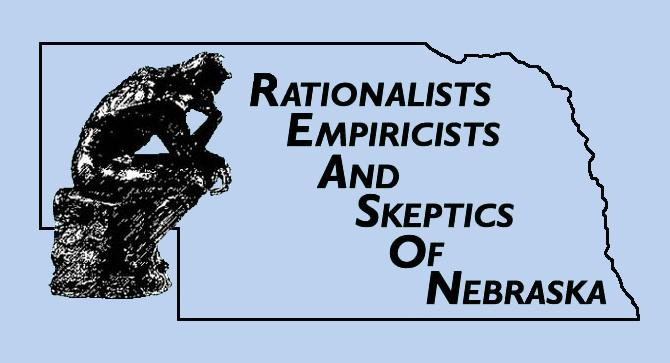Intelligent Design? I Don't Think So!
Voice of the New City Vol 1, Issue 8, March 24, 2005.
Skeptic's Corner
By Clay Farris Naff
REASON, www.reason.ws
There's monkey business afoot in Kansas once again and no telling if it will swing up to Nebraska. The Kansas Board of Education, with a new 6-4 creationist majority, seems determined to shove "intelligent design" into the science curriculum.
The intelligent design agenda is hardly a secret. Its adherents fear that science is undermining religion. They seek to defend the faith by discrediting evolution in favor of a "theory" that has practically no peer-reviewed scientific papers to its name. The few scientists who have gotten on board write books that in essence say, "I can't believe that evolution could have done all that!"
Law professor Phillip Johnson, who energized the movement with his book Darwin on Trial, says of science, "It has become the starting point … that God is imaginary rather than real." That will come as a shock to the many scientists, such as Creighton University biologist Charles Austerberry, who sincerely believe in God and evolution.
What Johnson and his acolytes want is scientific proof of a Creator. But before wedging intelligent design into the science curriculum, they should pause to consider how damaging this might be – not just to science but to religious faith.
The movement has been entirely a critique of evolutionary biology. No wonder. Here is the uncomfortable truth: if we apply the rules of scientific inquiry to the origins of life, the Universe and everything, we can infer a Creator. But it looks nothing like the deity most Americans worship.
God is generally said to be all-knowing, all-powerful, and all good. Does nature resemble the handiwork of a such a deity? Not much. The world that science reveals is wonderful, but it is also wasteful, chaotic, and cruel.
In nature, far more babies are born than will live to be parents. Starvation, predation, and disease thin the ranks of every species, even ours. Evolution makes sense of this.
But teach intelligent design as science, and students might start to ask, "What kind of creator shoves smallpox viruses into his world?" or "Why is the human birth canal so narrow and twisty that at least one in a hundred women used to die in childbirth?" or "What was the designer thinking when he made cancer genes?"
Churches, mosques and synagogues may have answers to such questions, but science teachers, debarred from teaching theology, can only shrug. Some may turn back to evolution, which provides thorough (if not comforting) explanations.
Of course, biology is not the only science in which intelligent design doesn't look too smart. Take geology. How does intelligent design hope to explain earthquakes? Are plate tectonics a sign of unfinished business? Or just sloppy craftsmanship?
Look at astronomy. Why is the solar system so full of rubble? And why does a hundred tons of it hit the earth every day, occasionally wiping out most of life?
How will teachers explain why tornadoes flatten churches? Or why lightning kills more golfers than criminals?
No loving, omnipotent deity can be saddled with direct responsibility for the natural world as science reveals it. Not unless we resort to the old line, "God moves in mysterious ways His wonders to perform." But by then, we've abandoned science and gone back to religion. Which is fine, provided it's not in the science classroom.
The great irony is that science need not be a threat to faith. For the past three years the Lincoln Forum on Science and Religion, which I chair, has brought together scientists, philosophers, Christians, Jews, Buddhists, Muslims, and a great variety of ordinary folk.
We haven't achieved consensus, but among the ideas we have developed are these: The realm of God may be entirely metaphysical. Why not? There's no spot on earth marked, "Eden – Do Not Enter." And surely heaven is not a physical place.
The natural world may be an emergent phenomenon, unmanaged by God except through the actions of his followers. Surely, that would be consonant with the Christian idea of free will and the Fall.
This kind of perspective need not diminish the ultimate hopes of the religious. Nor need it make scriptural narratives any less real. On the contrary, relating scripture to metaphysical realms restores the credibility that science has done so much to undermine.
Best of all, it leaves science educators free to stick to science.
------------
Clay Farris Naff is a writer living in Nebraska. He is editor of a forthcoming volume on evolution in the Exploring Science and Medical Discoveries series published by Greenhaven Press. More information on the Lincoln Forum on Science and Religion may found at www.rationalworld.org
